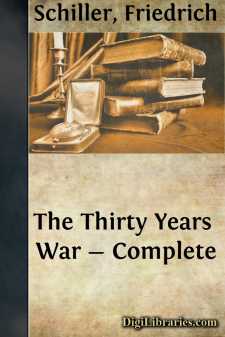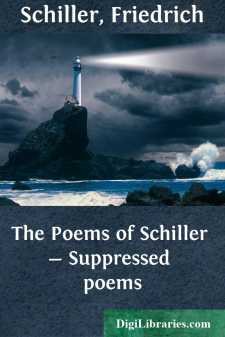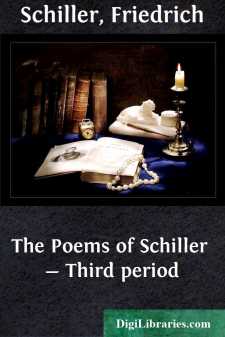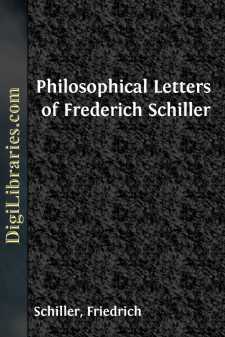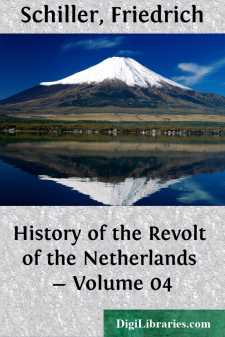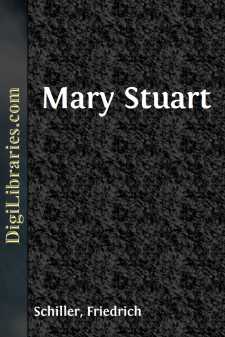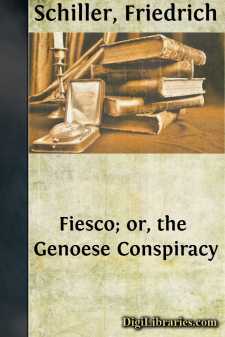Categories
- Antiques & Collectibles 13
- Architecture 36
- Art 48
- Bibles 22
- Biography & Autobiography 813
- Body, Mind & Spirit 142
- Business & Economics 28
- Children's Books 17
- Children's Fiction 14
- Computers 4
- Cooking 94
- Crafts & Hobbies 4
- Drama 346
- Education 46
- Family & Relationships 57
- Fiction 11829
- Games 19
- Gardening 17
- Health & Fitness 34
- History 1377
- House & Home 1
- Humor 147
- Juvenile Fiction 1873
- Juvenile Nonfiction 202
- Language Arts & Disciplines 88
- Law 16
- Literary Collections 686
- Literary Criticism 179
- Mathematics 13
- Medical 41
- Music 40
- Nature 179
- Non-Classifiable 1768
- Performing Arts 7
- Periodicals 1453
- Philosophy 64
- Photography 2
- Poetry 896
- Political Science 203
- Psychology 42
- Reference 154
- Religion 513
- Science 126
- Self-Help 84
- Social Science 81
- Sports & Recreation 34
- Study Aids 3
- Technology & Engineering 59
- Transportation 23
- Travel 463
- True Crime 29
Friedrich Schiller
Friedrich Schiller (1759–1805) was a seminal German playwright, poet, and philosopher, known for his profound influence on German literature and drama. His notable works include "The Robbers," "William Tell," and "Ode to Joy," the latter of which was famously set to music by Beethoven in his Ninth Symphony. Schiller's writings often explored themes of freedom, justice, and the struggle against tyranny, making him a pivotal figure in the Sturm und Drang movement and German Romanticism.
Author's Books:
Sort by:
BOOK I. FROM THE PAPERS OF COUNT O——— I am about to relate an adventure which to many will appear incredible, but of which I was in great part an eye-witness. The few who are acquainted with a certain political event will, if indeed these pages should happen to find them alive, receive a welcome solution thereof. And, even to the rest of my readers, it will be, perhaps, important as a...
more...
The present is the best collected edition of the important works of Schiller which is accessible to readers in the English language. Detached poems or dramas have been translated at various times since the first publication of the original works; and in several instances these versions have been incorporated into this collection. Schiller was not less efficiently qualified by nature for an historian...
more...
SUPPRESSED POEMS. THE JOURNALISTS AND MINOS. I chanced the other eve,—But how I ne'er will tell,—The paper to receive.That's published down in hell. In general one may guess,I little care to seeThis free-corps of the pressGot up so easily; But suddenly my eyesA side-note chanced to meet,And fancy my surpriseAt reading in the sheet:— "For twenty weary springs"(The post from...
more...
POEMS OF THE THIRD PERIOD. THE MEETING. I see her still—by her fair train surrounded,The fairest of them all, she took her place;Afar I stood, by her bright charms confounded,For, oh! they dazzled with their heavenly grace.With awe my soul was filled—with bliss unbounded,While gazing on her softly radiant face;But soon, as if up-borne on wings of fire,My fingers 'gan to sweep the sounding...
more...
THE INVINCIBLE ARMADA. She comes, she comes—the burden of the deeps!Beneath her wails the universal sea!With clanking chains and a new god, she sweeps,And with a thousand thunders, unto thee!The ocean-castles and the floating hosts—Ne'er on their like looked the wild water!—WellMay man the monster name "Invincible."O'er shuddering waves she gathers to thy coasts!The horror that...
more...
POEMS OF THE FIRST PERIOD. HECTOR AND ANDROMACHE. [This and the following poem are, with some alterations, introducedin the Play of "The Robbers."] ANDROMACHE.Will Hector leave me for the fatal plain,Where, fierce with vengeance for Patroclus slain,Stalks Peleus' ruthless son?Who, when thou glid'st amid the dark abodes,To hurl the spear and to revere the gods,Shall teach thine orphan...
more...
The reason passes, like the heart, through certain epochs and transitions, but its development is not so often portrayed. Men seem to have been satisfied with unfolding the passions in their extremes, their aberration, and their results, without considering how closely they are bound up with the intellectual constitution of the individual. Degeneracy in morals roots in a one-sided and wavering...
more...
The two counts were a few weeks after their arrest conveyed to Ghent under an escort of three thousand Spaniards, where they were confined in the citadel for more than eight months. Their trial commenced in due form before the council of twelve, and the solicitor-general, John Du Bois, conducted the proceedings. The indictment against Egmont consisted of ninety counts, and that against Horn of sixty....
more...
SCENE I. A common apartment in the Castle of Fotheringay. HANNAH KENNEDY, contending violently with PAULET, who is aboutto break open a closet; DRURY with an iron crown. KENNEDY.How now, sir? what fresh outrage have we here?Back from that cabinet! PAULET.Whence came the jewel?I know 'twas from an upper chamber thrown;And you would bribe the gardener with your trinkets.A curse on woman's...
more...
ACT I.SCENE I.A Saloon in FIESCO'S House. The distant sound of dancing andmusic is heard. LEONORA, masked, and attended by ROSA and ARABELLA, enters hastily. LEONORA (tears off her mask). No more! Not another word! 'Tis as clear as day! (Throwing herself in a chair.) This quite overcomes me—— ARABELLA. My lady! LEONORA (rising.) What, before my eyes! with a notorious coquette! In presence...
more...



